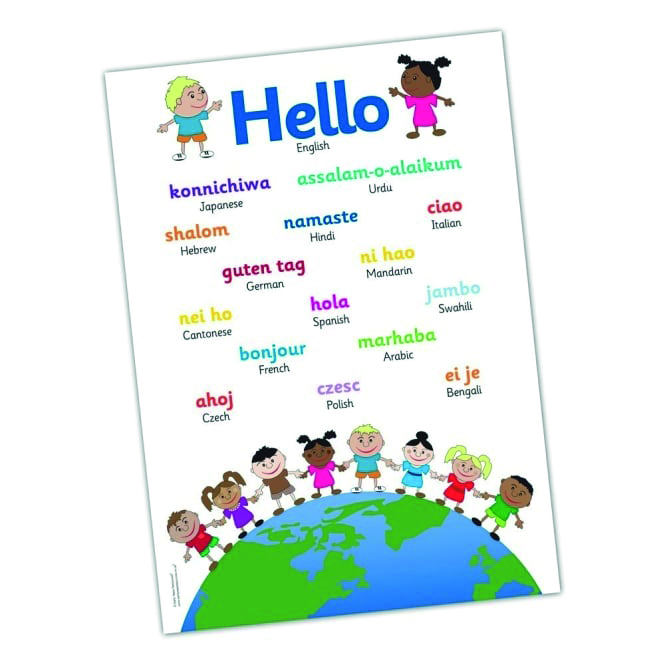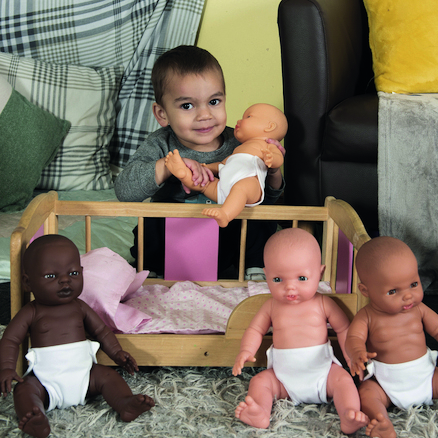
Celebrating children’s uniqueness and what makes them special is a key part of nursery life. No matter what culture or ethnic background, gender or disability they have, every child needs to develop a secure and positive sense of their own identity.
‘Starting nursery is when “Who am I?” becomes an urgent question,’ explains Nancy Stewart, project lead for Birth to 5 Matters. ‘It’s often the child’s first experience of the wider social world, away from the home and family they know and belong. This disorientation matters deeply because we are social beings, and we rely on a sense of being known and belonging as a core part of our emotional wellbeing. For a child, feeling safe and cared for matters first and foremost, and this begins with being consistently noticed, heard and valued as an individual.’
The enabling environment plays a ‘valuable role’ in helping children develop a ‘sense of self’, according to Michelle Reid, editor of RM Educational Resources. ‘Offering a wide variety of versatile, open-ended resources, gives children the opportunity to learn more about themselves as they make choices, interact, explore and develop their own interests.’
Take a set of mirrored pebbles, for example. Some children may choose to peer into them while discussing their feelings; others might group and sort them or look for similarities and differences. ‘From one simple resource, every child can explore their learning from many different angles, whether it relates to their personal identity, emotions or developing an awareness and confidence about their skills and abilities,’ explains Reid.
Offering children a predictable routine, where they are given notice if things are going to change, also encourages a secure sense of self. It also helps if children know where everything is, so they can access resources independently. Supporting children to feel good about themselves and their choices will increase their confidence.
PRACTITIONERS’ ROLE
The role of the adult is to ‘act as a mirror, shining back to the childa positive interest in who they are’, according to Stewart. This can start with a home visit, where practitioners ‘honour’ the child’s home and family, and later bring elements of the child’s culture and home interests into the setting. ‘The key person role is crucial,’ she explains. ‘Making an emotional link to the child and family requires a consistent, available adult. There are also environmental aspects, such as ensuring that all children can see images similar to themselves within the setting, and in books.’
The most important way to ensure each child feels special is to ‘tune in’ and respond to them ‘warmly’, celebrating the unique individuals that they are, Stewart says. However, she also advises practitioners to ‘be alert’ to any children who are being ‘left out’ of play. ‘Support them emotionally and facilitate them to join in.’
Children who have a positive sense of self are more likely to take part in new experiences and challenge themselves. Those who do not feel a secure sense of belonging may find it more difficult to settle into their environment and may struggle to learn or develop.
IN THE NURSERY
It is also important to talk to children about the similarities and differences between people in a positive way. Birth to 5 Matters advises settings to reflect children’s ‘socio-cultural and ethnic backgrounds’, as well as those of the wider community, in the ‘environment, play opportunities and resources’. There should be ‘items that are familiar to each child’, it adds.
RESOURCES AND SUGGESTIONS TO SUPPORT A SENSE OF SELF
 Include photographs of the children and their families and friends and welcome messages translated into different languages. Early Years Resources’ Hello Poster, £2.99, is a good example, or try its I Am Unique Poster Pack, £43.99.
Include photographs of the children and their families and friends and welcome messages translated into different languages. Early Years Resources’ Hello Poster, £2.99, is a good example, or try its I Am Unique Poster Pack, £43.99.
Mirrors, such as TTS’s Write On Emotions Mirrors, 10pk, £34.99, or its Sensory Mirrored Stacking Pebbles, £16.99, are also useful for discussions around similarities and differences.
Recognise each child’s social and cultural context by talking about the places they go and the celebrations they take part in. Provide a role-play area resourced with materials reflecting children’s family lives and communities. Include dolls from a range of different ethnic groups, such as TTS’s Realistic Baby Dolls, £24.99, or fabrics from around the world that children can use for dressing-up, such as Millwood Education’s Multicultural Printed Fabric Pieces, £99, or perhaps source from your local market or shops.
In the home corner, include everyday artefacts that promote cultural diversity, such as a wok or bamboo steam cooker, along with play food. Try Yellow Door’s Food of the World, Sensory Play Stones, £22.50; or Cosy’s Real Deal Multicultural Home Corner Set, £36.99. Add photo albums showing families from different ethnic backgrounds celebrating festivals and other cultural events.
Enrich small-world play with Early Excellence’s Set of Mixed Family People, £54.95, or TTS’s Small World Multicultural Dolls House Families, £19.99, which come in White, Asian and Black. For abstract representations, try Cosy’s Giant Outdoor Multicultural Peg People, £44.90; Yellow Door’s People Like Me figures, £22; or TickIt’s Rainbow Wooden Community People, £19.99, or Wooden Community People Blocks, £65.99.

Use Persona Dolls to explore issues such as racism, gender and disability during circle time.
Use books to engage children in thinking about similarities and differences. Try TTS’s Cultures and Settings Storybook Pack, £199.99, using Early Excellence’s Family Character Finger Puppet Set, £26.95, alongside.
Provide mark-making and collage materials that allow children to accurately represent their skin colour and hair type. Try Hope Education’s Multicultural Crayons, 8pk, £2.99.
Display a globe or map, like Early Excellence’s World Globe, £39.95, so that children can see the countries that are talked about, the places their family live and the holiday destinations they have visited.
Provide books, stories, songs, music and other cultural artefacts that are drawn from a wide range of traditions and styles, such as Early Years’ Multicultural Music Instruments, £249.99.
Offer illustrated information books for children that approach diversity through shared experiences: welcoming a new baby, family celebrations, different games or important transitions, such as going to school.
case study: Flying Start @ Cornwall College
When a family of Syrian refugees arrived in Cornwall, they had only been in the country for 50 hours when the three children started at Flying Start Nursery @ Cornwall College in Pool. Sophia Rose, director of the family-run chain of four nurseries in south Cornwall, says, ‘They suddenly found themselves in a setting with 77 other children, none of whom could speak their language. We quickly learnt that nodding our head for the British “yes” meant the opposite, and vice versa. However, with translation support we learnt about the children’s interests and helped them to settle by providing role-play opportunities and limiting too much excitement, as it was too overwhelming at first.
‘Special “friends” helped the new children explore the nursery and join in with activities. We expanded the opportunities in child-led exploration to include cultural dress and familiar food, which became part of continuous provision, not just a token gesture. To ensure cultural sensitivity, we talked to the families and included children’s hijabs and lots of lovely materials to explore wrapping headscarves. We talked to the children about their special use and, following feedback from families, encouraged children to wear the headscarves in their explorative play. This helped them understand that it’s not “fancy dress” but the usual dress that ladies wear while leading their lives. As a staff team, we explored empathy and used role-play scenarios to experience what it’s like for these children. We listened to Arabic radio to understand the noise and stress of not understanding a language.’
Rose also delivers training on multi-culturalism and positive diversity inclusion to other settings across Cornwall through the nursery group’s sister training company, TLC Training. She says, ‘It is important to explore and celebrate differences and enrich cultural awareness for both children and staff – particularly ensuring children who are from a different culture, religion or country have their heritage celebrated and shared with their peers.’









